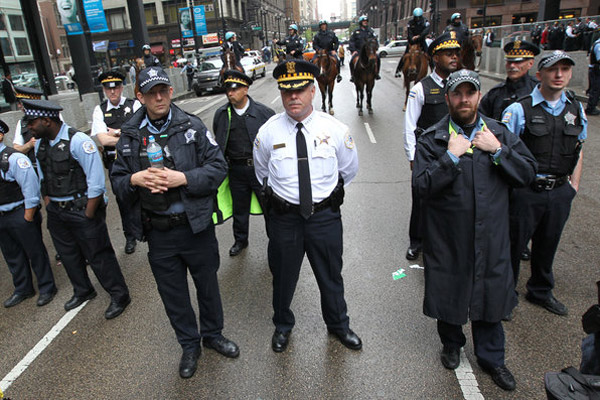
In his recent Chicago story on Garry McCarthy, Noah Isackson asked: "Why don’t the crime-fighting strategies that worked so effectively in New York and Newark seem to be working here?" One answer he got had to do with the disbandment of specialized gang units:
One thing that McCarthy can’t do, however, is rely on units that specialize in fighting gangs—the teams that Hillard began disbanding as interim superintendent. McCarthy hasn’t moved to reinstate them, arguing that the officers’ expertise is better used in the districts. That’s one reason his gang strategy has failed to rouse support among the rank and file, whose job it is to proactively police the beats in the way their boss demands.
[snip]
According to Weis, the city’s sub-500 murder totals in 2009, 2010, and 2011 were a direct result of that decision. “Sometimes the answer is staring you right in the face,” he says.
“Everyone loves the idea of the beat cop,” adds a South Side officer who worked in a specialized unit and didn’t want to be named because he is not authorized to talk to reporters. “You’re Officer Friendly; you’re walking around, whistling, twirling your baton. I get it. It’s a great story. But that’s not where we are right now in society. We’ve got some neighborhoods that are hell on earth. Officer Friendly can only be as friendly as the neighborhood allows.”
McCarthy's contention is that "with specialization, those guys have zero connection to the community…. They offend a lot of people because not everybody is a perp." Where does it come from? A piece by Jonathan Alter on Chicago's new administration, I think, provides a clue, in an aside on McCarthy:
Before any real progress on crime can be made, police-civilian relations must improve. McCarthy says he has been particularly influenced in recent years by the work of Tom Tyler, a psychologist at NYU, and Tracey Meares, a law professor at Yale. “It turns out that the reason people comply with the law isn’t because they’re afraid of going to jail,” he says. “A large body of evidence shows that people comply with the law because of police legitimacy.”
I was reminded of this by the remarkable statistics David Heinzmann reported on the other day:
Through the first seven months of 2012, there were 1,165 nonfatal shooting cases in Chicago, according to police records reviewed by the Tribune. Investigations into 75.9 percent of those cases have been classified as "suspended" because the victims declined to cooperate with police, the statistics show.
Three quarters of this year's nonfatal shootings have gone cold because the victims won't help the cops. This is where Meares's work enters the picture. She was something of a star at the University of Chicago Law School—five years after getting her undergrad degree in engineering from UIUC, she had earned her J.D. at the U. of C., clerked on the Seventh Circuit, and returned to teach there—before moving to Yale recently. And prominent in her areas of expertise are fairness and legitimacy: in short, how much people trust the cops and the legal system. Take the following from Meares's 2009 lecture The Legitimacy of Police Among Young African-American Men:
I believe that the form of policing that has the potential to solve the "race issue" emphasizes process rather than outcomes and moral engagement as opposed to notions of criminal deterrence. The most important aspect of this type of policing is the notion of legitimacy—a term about which I shall try to explicate in some detail below.
This might, out of context, sound a bit misleading. Meares wants to prevent crime as much as anyone, but for her the question begins: "Why do people obey the law?" Criminal deterrence above refers to the idea that people are afraid of the consequences. Which are high, if you think about the possible jail term for shooting someone; less so, if you consider that 75.9 percent of 1,165 shootings this year are suspended because the people who were actually shot won't cooperate. It's not an encouraging statistic for deterrence, even if you believe Gary Becker's famous contention that the most effective deterrence is the odds of getting caught, not the severity of the punishment. Meares wants to do something else, something much more bold: "The PSN [Project Safe Neighborhoods] team also believed, consistent with theories of legitimacy detailed above, that the key to changing patterns of gun crime lies in altering the normative beliefs of gun users themselves."
Consider this in the context of Robert Sampson's research in Chicago into what he calls "legal cynicism," essentially the reverse of legitimacy:
Contrary to received wisdom, we that African Americans and Latinos are less tolerant of deviance—including violence—than whites. At the same time, neighborhoods of concentrated disadvantage display elevated levels of legal cynicism, dissatisfaction with police, and tolerance of deviance unaccounted for by sociodemographic composition and differences. Concentrated disadvantage also helps explain why African Americans are more cynical about law and dissatisfied with the police.
Sampson's work obviously meshes with Meares's, as he acknowledges:
Meares and Kahan encourage policymakers to attend to the unintended consequences of get-tough policies and heavy-handed enforcement practices on a community's ability to contribute to crime-reduction efforts…. Such norm-sensitive strategies have the potential to alleviate some of the legal cynicism that pervades disadvantaged communities, expressed even by residents with little tolerance for the crime that surrounds them.
It's new, as David M. Kennedy has written, so it's still very controverial, but that's the logic, and the current criminology, that McCarthy is coming from.
PS: Tracy Meares discusses legitimacy:
(more here)


